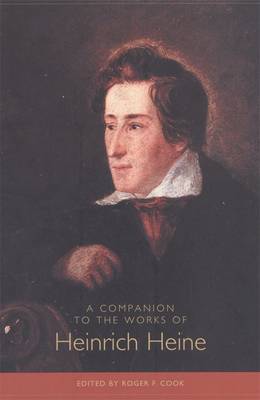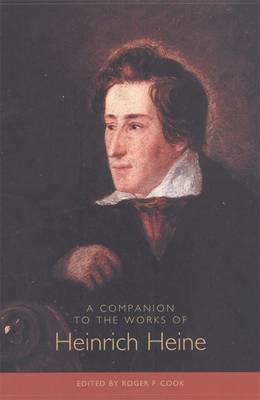
- Afhalen na 1 uur in een winkel met voorraad
- Gratis thuislevering in België vanaf € 30
- Ruim aanbod met 7 miljoen producten
- Afhalen na 1 uur in een winkel met voorraad
- Gratis thuislevering in België vanaf € 30
- Ruim aanbod met 7 miljoen producten
Zoeken
A Companion to the Works of Heinrich Heine
€ 64,45
+ 128 punten
Omschrijving
As the most prominent German-Jewish Romantic writer, Heinrich Heine (1797-1856) became a focal point for much of the tension generated by the Jewish assimilation to German culture in a time marked by a growing emphasis on the shared ancestry of the German Volk. As both an ingenious composer of Romantic verse and the originator of modernist German prose, he defied nationalist-Romantic concepts of creative genius that grounded German greatness in an idealist tradition of Dichter und Denker. And as a brash, often reckless champion of freedom and social justice, he challenged not only the reactionary ruling powers of Restoration Germany but also the incipient nationalist ideology that would have fateful consequences for the new Germany--consequences he often portended with a prophetic vision born of his own experience. Reaching to the heart of the `German question, ' the controversies surrounding Heine have been as intense since his death as they were in his own lifetime, often serving as an acid test for important questions of national and social consciousness. This new volume of essays by scholars from Germany, Britain, Canada, and the United States offers new critical insights on key recurring issues in his work: the symbiosis of German and Jewish culture; emerging nationalism among the European peoples; critical views of Romanticism and modern philosophy; European culture on the threshold to modernity; irony, wit, and self-critique as requisite elements of a modern aesthetic; changing views on teleology and the dialectics of history; and final thoughts and reconsiderations from his last, prolonged years in a sickbed. Roger F. Cook is professor of German at the University of Missouri, Columbia.
Specificaties
Betrokkenen
- Uitgeverij:
Inhoud
- Aantal bladzijden:
- 388
- Taal:
- Engels
- Reeks:
- Reeksnummer:
- nr. 69
Eigenschappen
- Productcode (EAN):
- 9781571134493
- Verschijningsdatum:
- 1/06/2010
- Uitvoering:
- Paperback
- Formaat:
- Trade paperback (VS)
- Afmetingen:
- 152 mm x 229 mm
- Gewicht:
- 571 g

Alleen bij Standaard Boekhandel
+ 128 punten op je klantenkaart van Standaard Boekhandel
Beoordelingen
We publiceren alleen reviews die voldoen aan de voorwaarden voor reviews. Bekijk onze voorwaarden voor reviews.







